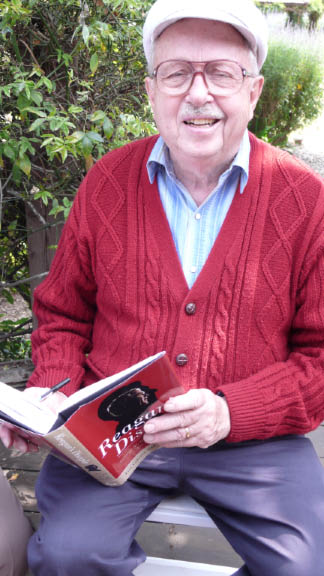One for the Gipper
Lou Cannon's New Book Assesses Bush Jr. Through Reagan's Legacy

During his 2000 campaign and after his election, George W. Bush and his aides talked of modeling his administration after that of former president Ronald Reagan. The authors of Reagan’s Disciple ask: Did George Bush steam full-speed ahead with the so-called “Reagan Revolution”-or derail it?
Reagan biographer Lou Cannon of Summerland and his journalist son Carl examine both presidencies in detail but keep coming back to the fact that Bush started a foolish, unnecessary war while Reagan carefully avoided plunging the nation into such a mess.
That, in a nutshell, is Bush’s legacy-and Reagan’s. There’s good reason to think that the Gipper was too cautious to have invaded Iraq, no matter how much he despised Saddam Hussein. Reagan, however, certainly would have watched for solid evidence of Hussein’s efforts toward nuclear weapons production, as opposed to the flawed intelligence Bush was all too eager to act on. We’re told that “ultra-conservatives” in the Reagan White House wanted to send troops into Nicaragua after Congress cut off aid to the Contras, but that Reagan refused. “Those sonofabitches won’t be happy until we have 25,000 troops in Managua, and I’m not going to do it,” chief of staff Ken Duberstein quoted Reagan as saying.
“Bush was Reagan’s disciple, to be sure,” the authors say, “but he did not face the seminal crises of his administration-especially the Iraq War-with the blend of principle and pragmatism that was the hallmark of Reagan’s dealings with the Soviet Union.
“We do not fault Bush’s intentions, but noble intentions do not excuse his performance in Iraq or the domestic failures of his second term. Nor do they explain his refusal to learn from his mistakes.”
The Cannons are not liberal Bush-bashers-far from it. They generally give both Reagan and Bush the benefit of the doubt in many instances. Conservatives writing about other conservatives do not always strike sparks. Still, this is a highly detailed and intelligent analysis of two presidents, men of far different temperaments.
Both presidents, although railing against “big government,” ran up huge deficits, red ink that Bush is still writing his budgets with. Both cut taxes, leading in part to the deficits, their critics say.
“There are two principle reasons why conservatives have soured on George W. Bush,” the authors observe in a preface. One is uneasiness about the war. The other is Bush’s blithe embrace of deficit spending, necessitated, in part, to finance that war.
The Cannons also raise another the question: Had Al Gore been elected president in 2000-he did win the popular vote, after all-would he have invaded Iraq? Gore, the authors say, answered that he would have invaded Afghanistan, but not Iraq.
Not everyone will agree with the authors’ arguments and views on the two presidencies, but father and son write with skill and the benefit of their White House experiences.
Lou Cannon covered Reagan for 36 years, first as California governor, then for the Washington Post during Reagan’s presidency. Carl Cannon covered the Bush White House for the National Journal and is the coauthor of Boy Genius: Karl Rove, the Architect of George W. Bush’s Remarkable Political Triumphs.
4•1•1
Reagan’s Disciple: George W. Bush’s Troubled Quest for a Presidential Legacy by Lou Cannon and Carl M. Cannon is published by Public Affairs. For more information, see publicaffairsbooks.com.



